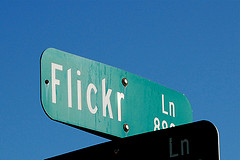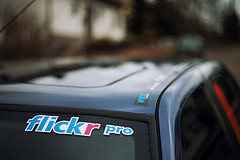Being Legally Right Doesn’t Always Mean You Are Doing Right by the Community

Credit: John McStravick (CC BY 2.0)
Flickr has begun selling canvas prints of images uploaded to its photo sharing community. Some of the images that are available for purchase use the standard copyright license, meaning that Flickr has secured permission from the photographer, or rights holder, to sell the image as a print. These creators are getting a cut of the proceeds.
However, Flickr is also making available countless photos that have been released under a less restrictive copyright license, one of the Creative Commons (CC) licenses. In these cases, they aren’t asking the photographers for permission – or paying them anything. This has led to a bit of a controversy.
How Creative Commons Licenses Work
The purpose of the CC licenses is to grant creators more flexibility in how they make their work available. Copyright is, by default, very restrictive. The CC licensing scheme seeks to ease those restrictions.
As a creator, you can choose the CC license that works for you. You can let people remix your work and build on top of it – or not. You can let people use it commercially – or not. You can even waive all rights to your work and essentially put it into the public domain. As long as you meet the terms of the CC license, you are free to use the image however you want, as dictated by that license.
When a photo is CC-licensed and allows for commercial use, anyone can sell it or profit from it as long as they comply with the terms of the license. For example, the CC BY 2.0 license is a common one that I see on Flickr. Here’s what the license means:
- You can “copy and redistribute the material in any medium or format.”
- You can “remix, transform, and build upon the material.”
- You can do these things “for any purpose, even commercially.”
- The licensor/rights holder “cannot revoke these freedoms as long as you follow the license terms.”
- You must provide appropriate credit, a link to the license and indicate if any changes were made to the work. “You may do so in any reasonable manner, but not in any way that suggests the licensor endorses you or your use.”
- You may not “apply legal terms of technological measures that legally restrict others from doing anything the license permits.”
In other words, if you upload a photo under this license, there is absolutely nothing stopping me from selling prints of the image, using the image in my television commercial or using the image on my blog, as long as I attribute in a correct, reasonable manner and don’t assert personal ownership over your work (and try to restrict others from using it). Everyone can sell it – and give you nothing. A hate group could use it. A political group you don’t agree with it could use it. You name it: they could use it. And profit from it.
That’s sort of the point of CC licenses or, at least, the commercial licenses. To allow people to use the work without asking for your permission, in a commercial manner, as long as they follow the license terms.
The Controversy
Flickr’s decision to sell these canvas prints has made some members of the community quite unhappy. The Wall Street Journal (WSJ) reported on it. What is clear to me, in reading the story, is that the photographers who are unhappy did not understand CC licensing. When you upload photos to Flickr, you are plainly able to choose the license you want. I have images on Flickr. None of them are under CC licenses, because I chose not to release them under those licenses. It isn’t hard or confusing.
But if you chose to release your photos under a CC license that allowed for commercial use and Flickr (or anyone else in the world) is selling your photos as canvas prints, there really is nothing you can do about it. You don’t have a legal leg to stand on. Commercial means commercial. I feel like the article in WSJ might confuse people, especially with this opening:
About twice a week, someone asks Liz West’s permission to use one of the nearly 12,000 images the amateur photographer has uploaded to the photo-sharing site Flickr over the past decade.
Ms. West is usually happy to comply. One woman in England created notecards using her floral pictures and sent her 100 cards in appreciation, she said. Vermont Castings, a stove and fireplace maker, used one of Ms. West’s photos on its website and shipped her a small stove as a gift.
If Ms. West’s images are released under a CC license, no one has to ask her permission for any use that fits the license. By licensing under CC, she has waived that right and no longer has the authority to deny use that is consistent with the license. It doesn’t matter if she is “usually happy to comply.” Adhering to the terms of the CC license is the compliance. If you ask her and she says no, it means nothing (from a legal perspective).
This is all to say that Flickr is completely in the right here, legally.
What Is Legal Isn’t the Only Standard for Community
But how much does that actually matter? In the WSJ piece, there is a quote by Flickr co-founder Stewart Butterfield that perfectly describes the situation.
Yahoo’s plan to sell the images appears “a little shortsighted,” said Flickr co-founder Stewart Butterfield, who left the company in 2008. “It’s hard to imagine the revenue from selling the prints will cover the cost of lost goodwill.”
It’s not about being legally right. Flickr is and, yes, the photographers who feel duped are not taking enough personal responsibility for their own choices. But it doesn’t really matter. Flickr is a community of photographers and, as such, photographers need to be their number 1 focus. Whatever amount of money they make off canvas prints, it’s not worth the betrayal that the members of their community feel due to what they believe is a misuse of their creations.
It doesn’t matter if everyone in the world is allowed to sell these canvas prints. Everyone else in the world doesn’t have the relationship that Flickr should have with its community. Everyone else doesn’t have to deal with the same consequences.
For this reason, I believe that Flickr should reverse course. They should yank CC-licensed photos out of the canvas prints program. They should apologize very publicly, as well as directly to those who complained reasonably. They should then allow every Flickr user to opt-in their photos to the canvas prints program, if they wish. Use a big and bold prompt on their next login. Explain what is going on and offer them the chance to opt in.
And offer them a cut of the sale. Make it the standard cut. Allow them to apply the money to a Flickr Pro or Ad Free account. Allow them to donate it to a charity if they want. Treat them just like the photographers who chose the standard copyright license.
You do that, not because you have to, but because you should. You do it because you are playing the long game. That’s what community is. The long game. Long term, doing this will make you more money and ensure your survival in a way that short term canvas print revenue never will.
Update: weeks later, Flickr decided to remove Creative Commons images from their Wall Art service.

